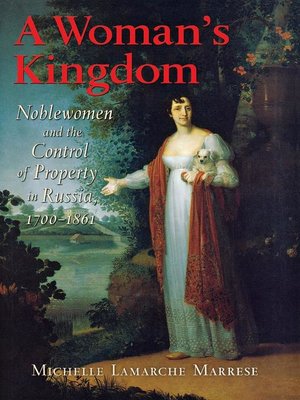A Woman's Kingdom
ebook ∣ Noblewomen and the Control of Property in Russia, 1700–1861
By Michelle Lamarche Marrese

Sign up to save your library
With an OverDrive account, you can save your favorite libraries for at-a-glance information about availability. Find out more about OverDrive accounts.
Find this title in Libby, the library reading app by OverDrive.



Search for a digital library with this title
Title found at these libraries:
| Loading... |
In A Woman's Kingdom, Michelle Lamarche Marrese explores the development of Russian noblewomen's unusual property rights. In contrast to women in Western Europe, who could not control their assets during marriage until the second half of the nineteenth century, married women in Russia enjoyed the right to alienate and manage their fortunes beginning in 1753. Marrese traces the extension of noblewomen's right to property and places this story in the broader context of the evolution of private property in Russia before the Great Reforms of the 1860s.
Historians have often dismissed women's property rights as meaningless. In the patriarchal society of Imperial Russia, a married woman could neither work nor travel without her husband's permission, and divorce was all but unattainable. Yet, through a detailed analysis of women's property rights from the Petrine era through the abolition of serfdom in 1861, Marrese demonstrates the significance of noblewomen's proprietary power. She concludes that Russian noblewomen were unique not only for the range of property rights available to them, but also for the active exercise of their legal prerogatives.
A remarkably broad source base provides a solid foundation for Marrese's conclusions. These sources comprise more than eight thousand transactions from notarial records documenting a variety of property transfers, property disputes brought to the Senate, noble family papers, and a vast memoir literature. A Woman's Kingdom stands as a masterful challenge to the existing, androcentric view of noble society in Russia before Emancipation.
|In A Woman's Kingdom, Michelle Lamarche Marrese explores the development of Russian noblewomen's unusual property rights. In contrast to women in Western Europe, who could not control their assets during marriage until the second half of the nineteenth century, married women in Russia enjoyed the right to alienate and manage their fortunes beginning in 1753. Marrese traces the extension of noblewomen's right to property and places this story in the broader context of the evolution of private property in Russia before the Great Reforms of the 1860s. Historians have often dismissed women's property rights as meaningless. In the patriarchal society of Imperial Russia, a married woman could neither work nor travel without her husband's permission, and divorce was all but unattainable. Yet, through a detailed analysis of women's property rights from the Petrine era through the abolition of serfdom in 1861, Marrese demonstrates the significance of noblewomen's proprietary power. She concludes that Russian noblewomen were unique not only for the range of property rights available to them, but also for the active exercise of their legal prerogatives.A remarkably broad source base provides a solid foundation for Marrese's conclusions. These sources comprise more than eight thousand transactions from notarial records documenting a variety of property transfers, property disputes brought to the Senate, noble family papers, and a vast memoir literature. A Woman's Kingdom stands as a masterful challenge to the existing, androcentric view of noble society in Russia before Emancipation.







